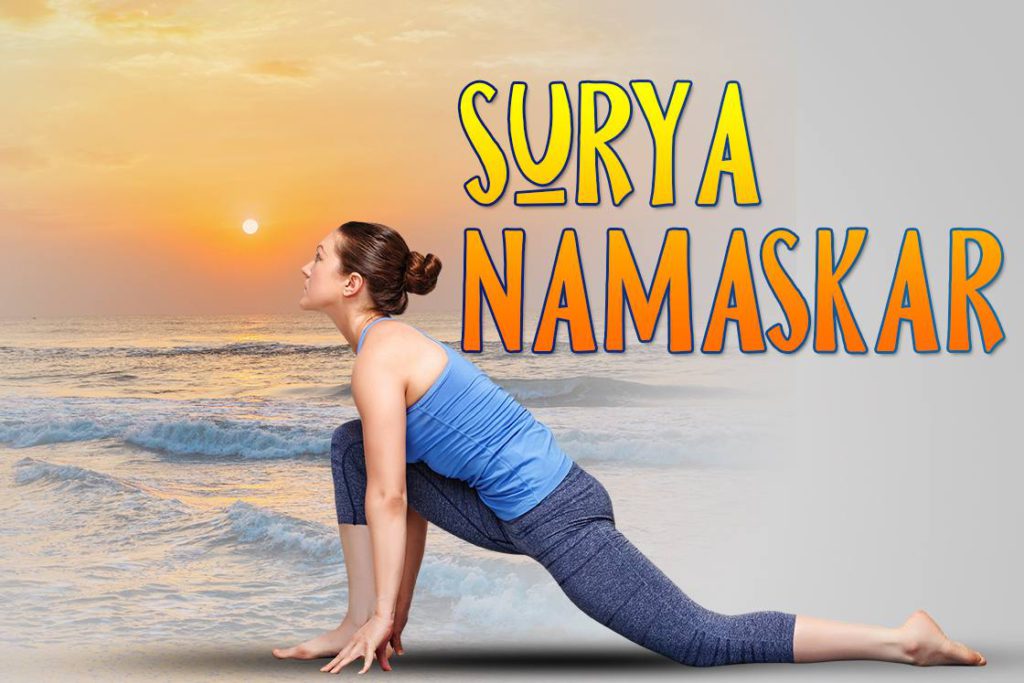
Surya Namaskar, generally generally known as Solar Salutation, is a transformative sequence of 12 yoga poses that harmoniously mix bodily postures, rhythmic respiratory, and non secular intent.
Rooted in Sanskrit, “Surya Namaskar” interprets to “Solar Salutation,” symbolizing a heartfelt salute to the solar. Past its bodily advantages, this follow holds profound significance in yoga, embodying a method to honor the solar as the last word supply of power.
Past the yoga mat, Surya Namaskar mirrors the pure rhythms of our world, echoing the twenty-four hours of the day, twelve zodiac phases, and the biorhythms of the physique.
On this information, we are going to study 12 steps of Surya Namaskar with its poses and well being advantages. Proceed studying to find extra..
Additionally learn: Surya Namaskar Varieties in Totally different Yoga Kinds (Hatha, Asthanga, Iyengar, and so on.)
What Is the That means of Surya Namaskar?
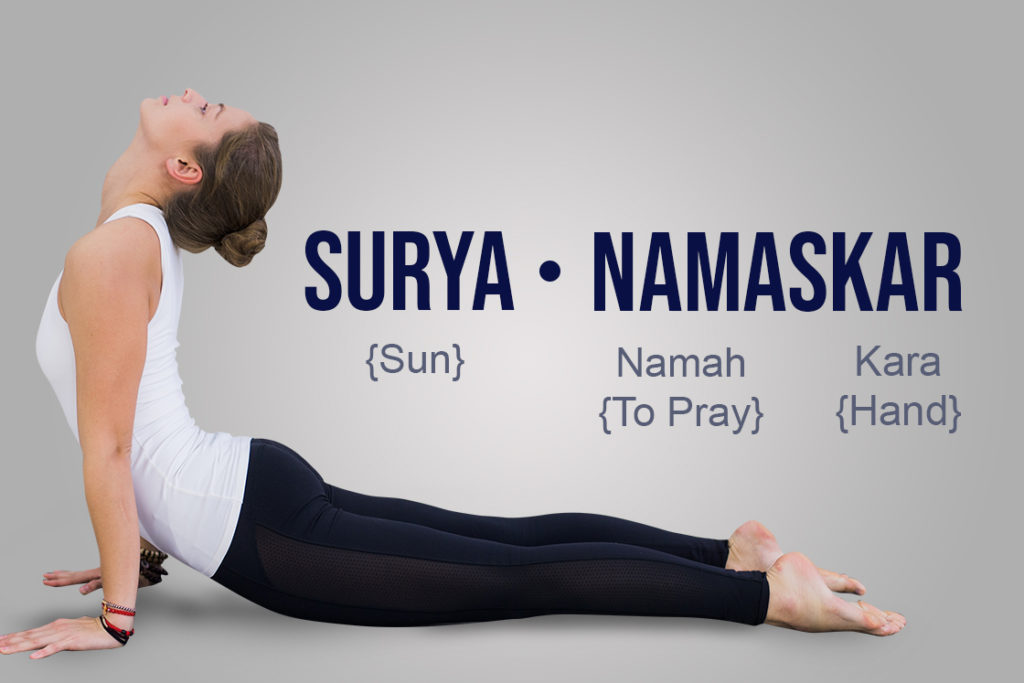
Surya Namaskar, originating from Sanskrit roots, interprets to “Solar Salutation.” The time period is a fusion of “Surya,” which means “Solar,” and “Namaskar,” a mix of “Namah” (to hope) and “Kara” (hand).
Surya Namaskar yoga sequence entails a sequence of twelve poses, every a singular type of prostration (Namaskar), symbolizing a heartfelt prayer to the solar.
Namaskar in Surya Namaskar is a symbolic gesture, akin to Anjali Mudra, the place the primary pose (Prayer pose) turns into an providing to the Divine. Within the context of Surya Namaskar, the practitioner’s 12 prostrations contain laying the physique face-down, a singular type of salutation directed in direction of the divine presence, represented by the solar in our earthly realm. The act acknowledges the solar because the epitome of divinity in our mundane existence.
Surya Namaskar probably stems from the traditional Surya Narayana Pujas, rituals relationship again 2,500 years. Curiously, within the yoga follow, surya namaskar gained prominence within the seventeenth century, with Saint Samarth Ramdas being an early advocate.
Additionally learn: The place did Surya Namaskar come from?
Surya Namaskar as a Non secular Follow
Past the physicality of yoga, Surya Namaskar transforms right into a profound non secular follow, a Sadhana that intertwines the physique, breath, and consciousness:
- Full Devotion: Surya Namaskar is a gesture of full devotion, the place the practitioner, via a sequence of prostrations, expresses reverence and gratitude to the solar because the divine supply of cosmic power.
- Integration of Asanas, Pranayama, Chanting, and Meditation: The follow goes past mere bodily postures. It integrates varied components comparable to asanas (poses), pranayama (breath management), and chanting of mantras making a holistic Sadhana.
- Pingala Nadi Regulation: The Pingala Nadi, a pranic channel symbolizing the solar, finds its stability via the follow of Surya Namaskar. This regulation, in flip, harmonizes the power ranges of the practitioner.
- Alignment with Non secular Vitality Facilities: Every motion in Surya Namaskar aligns with non secular power facilities, making a conduit for the practitioner to attach with increased states of consciousness.
As a non secular endeavor, Surya Namaskar turns into a sacred journey, guiding practitioners towards interior stability, mindfulness, and a deeper reference to the common energies.
Symbolic Illustration of Surya Namaskar
Surya Namaskar’s symbolic illustration transcends the yoga mat, echoing the celestial and earthly concord:
- Twenty-four Hours of the Day: Surya Namaskar mirrors the cycle of a day, aligning the twelve poses with the twenty-four hours, providing a conscious salute to the solar all through the day.
- Twelve Zodiac Phases of the Yr: In its sequence, Surya Namaskar dances via twelve poses, synchronizing with the zodiac’s twelve phases, embodying a celestial rhythm in every motion.
- Biorhythms of the Physique: The sequence resonates with the physique’s inside biorhythms, making a harmonious circulation that extends past the bodily postures to the very essence of our vitality.
- Homage to the Solar’s Sustaining Vitality: Surya Namaskar turns into a sacred ritual, paying homage to the solar for its position in sustaining life on Earth and regulating the whole photo voltaic system.
This symbolic richness infuses every pose with a deeper which means, making Surya Namaskar a holistic journey that transcends the boundaries of the yoga mat.
Surya namaskar for learners: Suggestions earlier than you begin
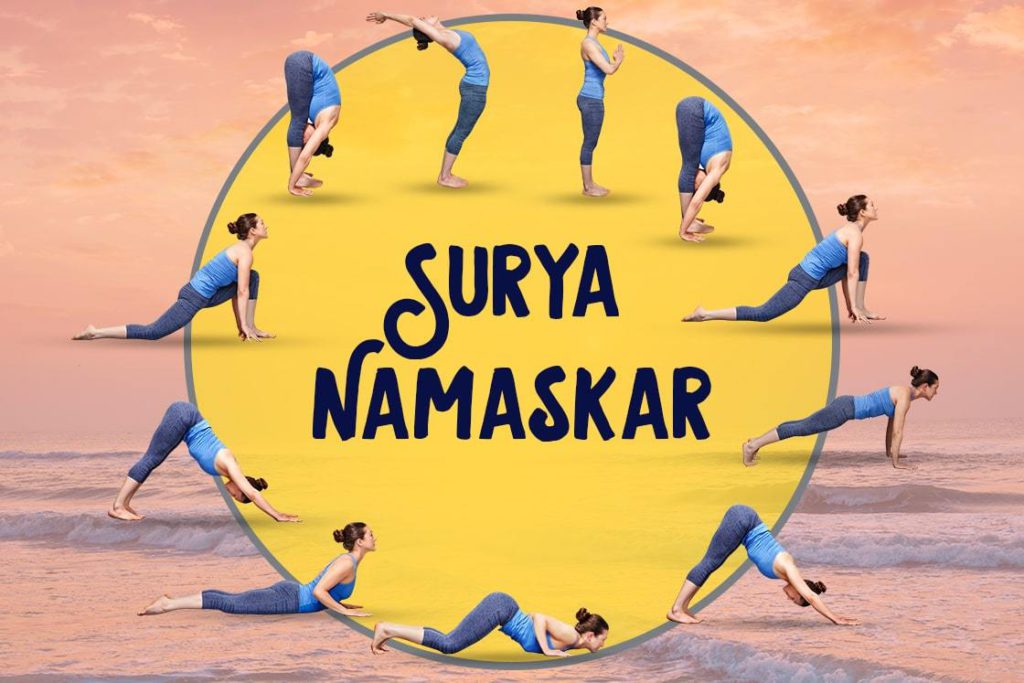
By specializing in alignment, coordinating breath, and steadily progressing, you lay a powerful basis for a satisfying yoga follow, making Surya Namaskar for learners a very enriching expertise.
To make sure a harmonious and helpful follow, think about the next suggestions:
- Alignment Focus: Guarantee correct alignment in every pose to forestall pressure and promote flexibility. Take note of toes, knees, and hand positioning for a balanced stance.
- Breath Coordination: Sync your breath with actions. Inhale throughout chest-opening poses, exhale throughout ahead bends. Rhythmic respiratory enhances power circulation.
- Conscious Posture: Keep conscious of posture. Have interaction core muscle tissues, calm down shoulders. This fosters damage prevention and strengthens the breath-movement connection.
- Gradual Development: Begin at a snug tempo, steadily growing depth. Hearken to your physique, avoiding overexertion, particularly in the event you’re new to yoga.
- Basic Tips:
- Follow Surya Namaskar on an empty abdomen, ideally within the morning going through the dawn or night going through the sundown.
- Heat-up with light stretches earlier than diving into the sequence to organize the joints and muscle tissues.
- If Surya Namaskar is your main train, conclude with a rest pose like Shavasana to permit the physique to soak up the advantages.
- Search Steering: If not sure about solar salutation poses or experiencing discomfort, seek the advice of a yoga teacher for customized suggestions. Your follow is a private journey; progress at your personal tempo.
Bear in mind, Surya Namaskar is a private journey, and every practitioner progresses at their very own tempo. By incorporating the following pointers, you may lay a powerful basis for a satisfying and transformative yoga follow.
What Are the 12 Steps of Surya Namaskar?
Dive into the 12 steps of Surya Namaskar with Pranamasana flowing via Hasta Utthanasana, Padahastasana, Ashwa Sanchalanasana, Chaturanga Dandasana, Ashtanga Namaskar, Bhujangasana, Adho Mukha Svanasana, and concluding with Pranamasana.
On this sequence of 12 steps, every step is a brand new pose that brings collectively breath, motion, and a little bit of spirituality.
Beneath is the break down of 12 poses of surya namaskar within the 12 steps in easy directions, making it simple so that you can get pleasure from this refreshing yoga follow.

- Step1 – Stand tall in Pranamasana (Prayer pose)
- Step2 – Inhale, stretch arms up & again in Hasta Utthanasana (Raised arms pose)
- Step3 – Exhale, bend ahead into Hastapadasana (Standing ahead bend)
- Step4 – Inhale, step again proper leg again into Ashwa Sanchalanasana (Equestrian pose)
- Step5 – Maintain the breath, Transition to Chaturanga Dandasana (four-limbed workers pose) by stepping each legs again
- Step6 – Exhale, drop your knees, chest, chin down in Ashtanga Namaskar (eight-limbed pose)
- Step7 – Inhale, increase the chest up into Bhujangasana (cobra pose)
- Step8 – Exhale, carry the hips and the tailbone up in Adho Mukha Svanasana (downward-facing canine pose)
- Step9 – Inhale, step ahead proper foot in Ashwa Sanchalanasana (Equestrian pose)
- Step10 – Exhale, step ahead left foot and are available in Hastapadasana (Standing ahead bend)
- Step11 – Inhale, stretch arms up & again in Hasta Utthanasana (Raised arms pose)
- Step12 – Exhale, stand tall in Pranamasana (Prayer pose).
12 Poses of Surya Namaskar with Steps, Advantages, and Precautions
1. Pranamasana (Prayer pose)
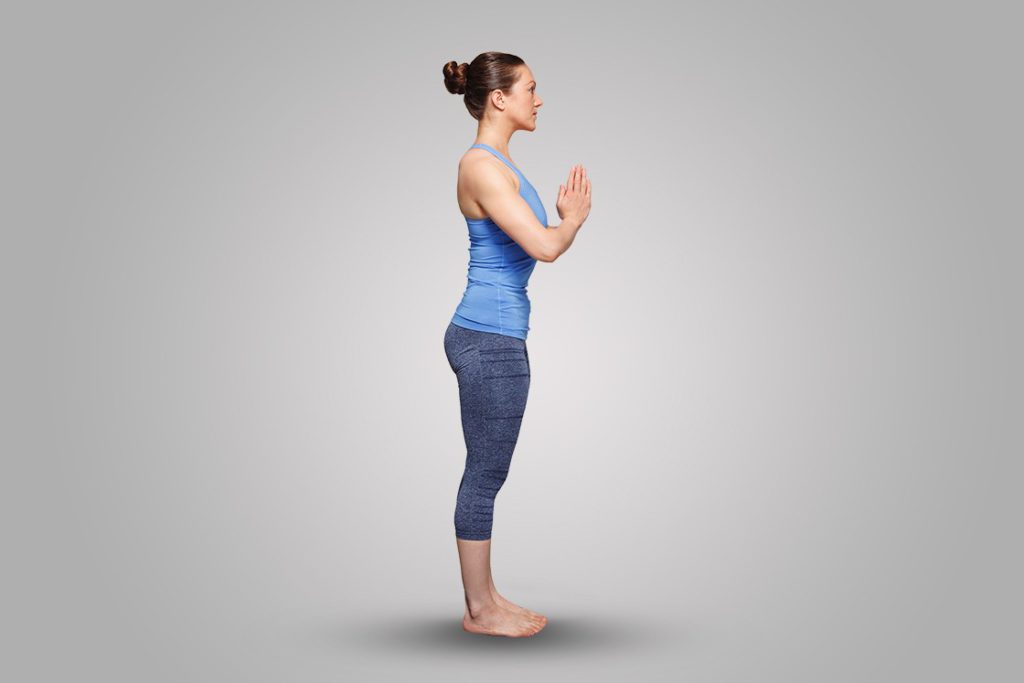
- Start in a standing place with toes collectively and arms alongside your physique.
- Gently bend your elbows, bringing your palms collectively in a Namaste gesture in entrance of your chest.
- Shut your eyes, permitting your whole physique to calm down, and preserve regular respiratory.
- Direct your focus in direction of the chest, emphasizing the Anahata Chakra, and chant “Om Mitraya Namaha“.
Advantages of Pranamasana (Prayer Pose)
- Centering Begin: Pranamasana serves as a grounding pose, serving to you heart your focus and set up a conscious starting to your follow.
- Emotional Alignment: The pose contributes to emotional stability, fostering a way of calm and interior concord.
- Coronary heart Opening: The pose entails bringing the palms collectively on the coronary heart heart, selling a delicate opening of the chest and activation of the Anahata Chakra.
- Thoughts-Physique Connection: By closing the eyes and specializing in the chest, Pranamasana enhances the mind-body connection, encouraging a deeper sense of presence.
Precautions for Pranamasana (Prayer Pose)
- Light Begin: Provoke the pose gently to forestall any pressure. Keep away from sudden or forceful actions earlier than transitioning to the following pose.
- Physique Consciousness: Take note of your physique alignment. Maintain the backbone straight with out overextending or rounding. Eyes stay closed and mentally prolong a heat greeting to the Solar, acknowledging it as the last word supply of life.
- Wrist Consolation: If you happen to expertise discomfort within the wrists or shoulders, be cautious whereas bringing the palms collectively. Modify the place to keep away from pressure.
- Stability: Guarantee steady footing, distributing your weight evenly on each toes. Keep away from locking the knees for higher stability and assist.
2. Hasta Utthanasana (Raised arms pose)
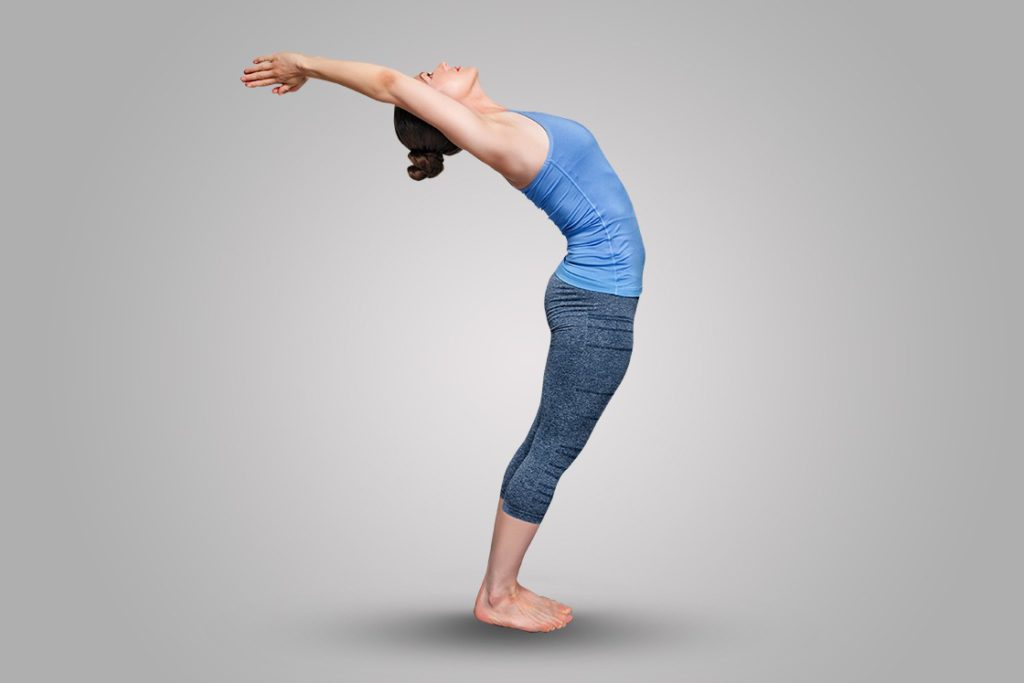
- Following a deep exhale in prayer pose, inhale as you separate your palms, lifting and increasing your arms overhead.
- Direct your gaze upward, gently arching your again, and pushing your pelvis ahead.
- Keep a shoulder-width distance between your arms.
- Expertise the stretch in your stomach and the growth of your lungs.
- Have interaction in chanting “Om Ravaye Namaha” in the course of the follow of Hasta Utthanasana for a harmonious connection
Advantages of Hasta Utthanasana (Raised Arms Pose)
- Energizing Stretch: Hasta Utthanasana supplies a revitalizing stretch to the arms, stomach, neck, and again muscle tissues, invigorating the whole higher physique.
- Chakra Stimulation: This pose stimulates the Vishuddhi chakra, selling a way of stability and positively influencing the thyroid and parathyroid glands, important for hormonal regulation.
- Digestive Help: Partaking in Hasta Utthanasana aids in enhancing digestion, fostering a wholesome and environment friendly digestive system.
- Aid from Pressure: The pose helps alleviate backaches and fatigue, providing reduction from delicate nervousness and selling a way of rest and well-being.
Precautions for Hasta Utthanasana (Raised Arms Pose)
- Moderation in Backbend: Method the backward bend in Hasta Utthanasana with moderation. Keep away from over-arching the again to forestall pressure.
- Shoulder Consciousness: Be conscious of your shoulders. When you have any current shoulder points, gently increase your arms to a snug place with out inflicting discomfort.
- Breath Consciousness: Keep consciousness of your breath. Keep away from holding your breath and guarantee a gradual and managed respiratory sample all through the pose.
- Adaptation for Well being Situations: When you have any pre-existing well being circumstances, notably associated to the backbone or shoulders, think about adapting the pose beneath the steering of a certified teacher.
3. Padahastasana (Standing ahead bend)
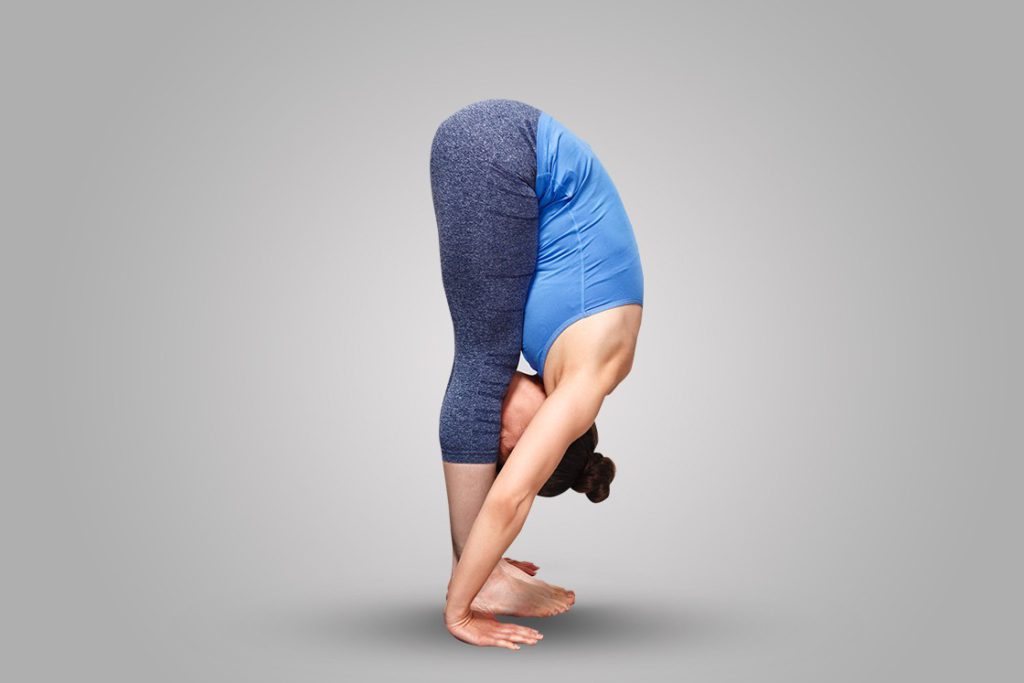
- Light exhale and start folding ahead from the hips, putting your palms on the ground on both facet of your toes.
- Goal to convey your head as shut as attainable to your knees, selling a deep stretch within the again and hamstrings.
- Enable the chest to relaxation in opposition to the thighs, sustaining a delicate ahead bend place.
- Improve the follow by chanting Surya Namaskar mantra “Om Suryaya Namaha,” synchronizing breath and motion for a harmonious expertise.
Advantages of Padahastasana (Standing ahead bend)
- Spinal Flexibility: Padahastasana enhances spinal flexibility, fostering a supple and resilient backbone.
- Muscle Stretch: The pose supplies a deep stretch to the muscle tissues within the again, hamstrings, and calves, selling improved flexibility.
- Circulatory Enhance: By bringing the pinnacle near the knees, Padahastasana encourages blood circulation to the mind, invigorating the nervous system.
- Digestive Help: The ahead bend compresses the belly organs, aiding digestion and selling a wholesome digestive system.
- Stress Aid: Padahastasana gives reduction from stress and stress, creating a relaxing impact on the thoughts and soothing the nervous system.
Precautions for Padahastasana (Standing ahead bend)
- Gradual Descent: Method the ahead bend steadily, particularly in the event you’re new to the follow. Keep away from sudden actions to forestall pressure.
- Bend with Ease: Whereas bending ahead, preserve a delicate and managed descent, guaranteeing you’re feeling a stretch with out pushing your physique past its comfy restrict.
- Knee Consciousness: Be conscious of your knees. When you have knee issues, think about barely bending your knees to ease stress on the joint.
- Again Sensitivity: When you have current points along with your again, carry out Padahastasana with care. Hinge from the hips, retaining your again straight, and keep away from rounding the backbone excessively.
4. Ashwa Sanchalanasana (Equestrian pose)
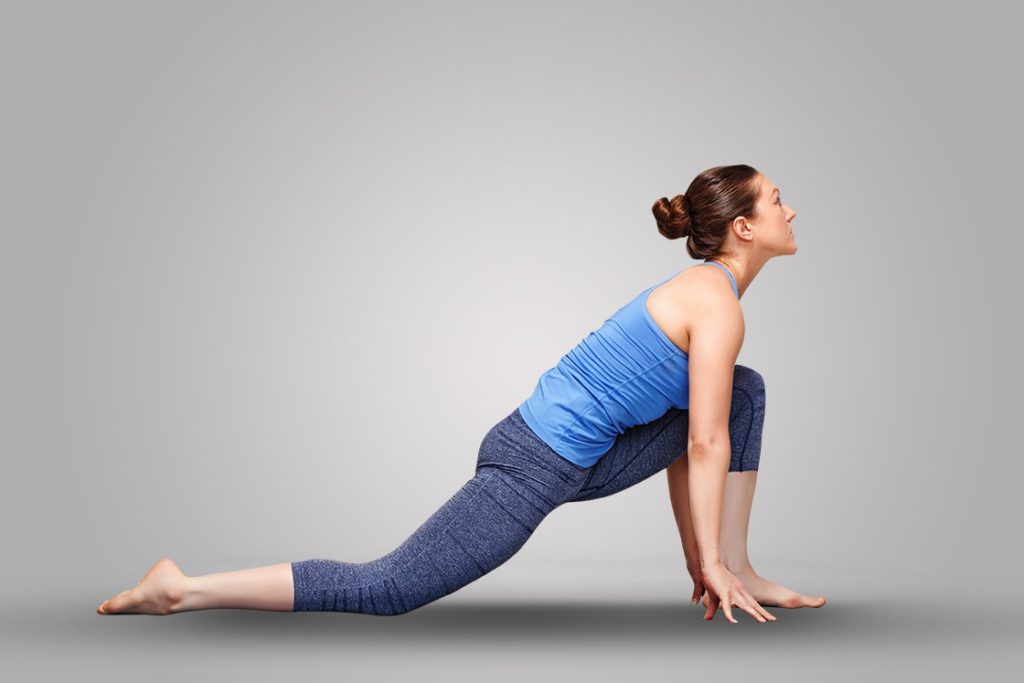
- Inhale deeply, stepping the correct leg again. Prolong it way back to comfy, putting the correct knee on the ground with toes tucked in.
- Bend the left knee, putting the foot on the ground and aligning it with the left hip. Make sure the left knee is instantly above the left ankle.
- Press your palms or fingertips firmly beside the left foot on the ground, making a steady basis.
- Arch your again and tilt your head backward, lifting your chin to gaze upward. Keep a delicate stretch within the entrance of the physique.
- Chant mantra “Om Bhanave Namaha” to reinforce the non secular connection and focus throughout this pose.
Advantages of Ashwa Sanchalanasana (Equestrian pose)
- Leg and Backbone Strengthening: This pose strengthens the legs and backbone, enhancing total stability and posture.
- Improved Lung Capability: Ashwa Sanchalanasana will increase lung capability and enhances the respiratory system, selling higher oxygenation.
- Energetic Activation: The pose prompts the Ajna Chakra, fostering psychological readability and enhancing mind capability.
- Aid from Illnesses: Common follow can alleviate points like constipation, indigestion, and sciatica, selling digestive and nervous system well being.
Precautions for Ashwa Sanchalanasana (Equestrian Pose)
- Knee Alignment: Guarantee correct alignment of the left knee above the left ankle to forestall pressure on the knee joint.
- Again Arching: Keep away from extreme arching of the again. Keep a average arch to guard the backbone and forestall overextension.
- Head Tilt: Whereas tilting the pinnacle backward, accomplish that gently to keep away from pressure on the neck. Maintain the motion inside a snug vary.
- Physique Weight Distribution: Be conscious of distributing physique weight evenly. Guarantee stability amongst each palms, the left foot, proper knee, and toes of the correct foot.
- Particular person Well being Situations: People with particular well being circumstances, comparable to knee or spinal points, ought to method this pose with warning.
5. Chaturanga Dandasana (4-limb pose)
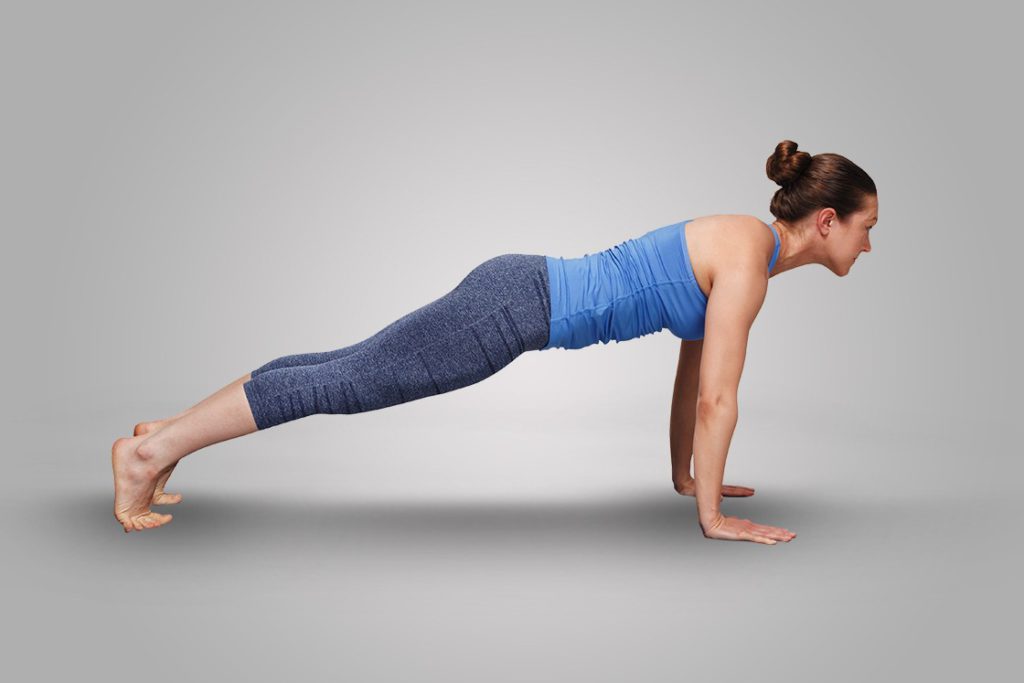
- Inhale, drawing the left foot backward, putting it beside the correct foot.
- Exhale, curling the toes in and urgent the palms on the ground, decrease the chest nearer to the ground.
- Steadiness the whole physique on the toes and palms, forming a straight line from head to heels.
- Maintain your breath on this place, specializing in sustaining a powerful and straight posture.
- Make sure the shoulders are stacked over the wrists, partaking the core muscle tissues for stability.
- Maintain the physique parallel to the ground, with managed and balanced alignment.
- Maintain the pose for just a few breaths, making ready for the transition to the following pose, Ashtanga Namaskar (Eight-Limbed Pose).
Advantages of Chaturanga Dandasana (4-Limb Pose)
- Core Strengthening: The pose actively engages the core muscle tissues, selling energy and stability within the belly area.
- Arm and Shoulder Firming: Chaturanga dandasana tones and strengthens the arms and shoulders, contributing to higher physique health.
- Improved Posture: Common follow helps enhance total posture by enhancing the energy of the spinal muscle tissues.
- Enhanced Stability: Holding the place challenges the whole physique, fostering stability and management within the torso and limbs.
Precautions for Chaturanga Dandasana (4-Limb Pose)
- Shoulder Alignment: Keep away from letting the shoulders dip beneath the elbows. Keep correct alignment to forestall pointless pressure on the shoulder joints.
- Wrist Well being: Deal with the wrists by guaranteeing they’re positioned instantly beneath the shoulders. Distribute weight evenly to keep away from extra strain on the wrists.
- Keep away from Sagging: Stop the decrease again from sagging by partaking the core muscle tissues. This helps defend the lumbar backbone and maintains a straight line from head to heels.
- Session for Accidents: People with wrist, shoulder, or decrease again accidents ought to search steering from a yoga teacher or healthcare skilled earlier than trying this pose.
- Conscious Respiration: As breath is held throughout this pose, people with respiratory circumstances or hypertension ought to follow with consciousness and seek the advice of an expert if wanted.
6. Ashtanga Namaskar (Eight Limbed pose)
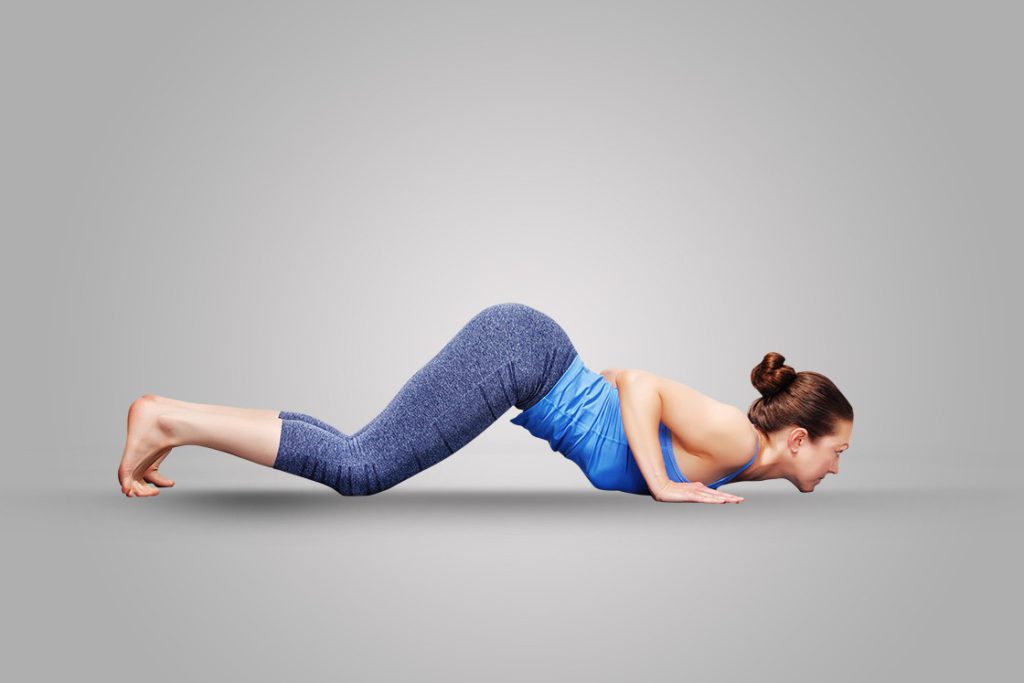
- Exhale, decrease the knees to the ground, taking the hips barely again.
- Slide slightly ahead, putting the chest and chin on the ground.
- Solely the toes, knees, chest, palms, and chin contact the ground.
- Maintain the buttocks, hips, and stomach raised.
- Maintain the posture whereas respiratory out and preserve the place with regular and managed breaths.
- Chant “Om Pushne Namaha” throughout this pose of the Solar Salutation sequence.
- Put together for the following pose, Bhujangasana (Cobra Pose), as you transition from Ashtanga Namaskar.
Advantages of Ashtanga Namaskar (Eight-Limbed Pose)
- Higher Physique Power: The pose builds energy within the arms, shoulders, and chest, contributing to total higher physique firming.
- Core Activation: Ashtanga Namaskar engages the core muscle tissues, selling belly energy and sturdy core.
- Spinal Flexibility: Common follow enhances the flexibility of the backbone, notably within the higher and mid-back areas.
- Therapeutic for Respiratory System: The pose entails managed respiratory, benefiting the respiratory system and selling lung capability.
- Stimulation of Digestive Organs: The compression created by the pose aids in massaging and stimulating the digestive organs, supporting wholesome digestion.
Precautions for Ashtanga Namaskar (Eight-Limbed Pose)
- Wrist Sensitivity: People with wrist points must be cautious and will select to switch the pose through the use of props or choosing various variations.
- Decrease Again Well being: Take care to not overarch the decrease again. Have interaction the core muscle tissues to supply assist and keep away from extra pressure on the lumbar backbone.
- Neck Alignment: Maintain the neck in a impartial place, avoiding extreme pressure. Make sure the chin is barely tucked to take care of correct alignment.
- Session for Accidents: People with current shoulder, neck, or decrease again accidents ought to seek the advice of with a yoga teacher or healthcare skilled earlier than trying this pose.
7. Bhujangasana (Cobra pose)
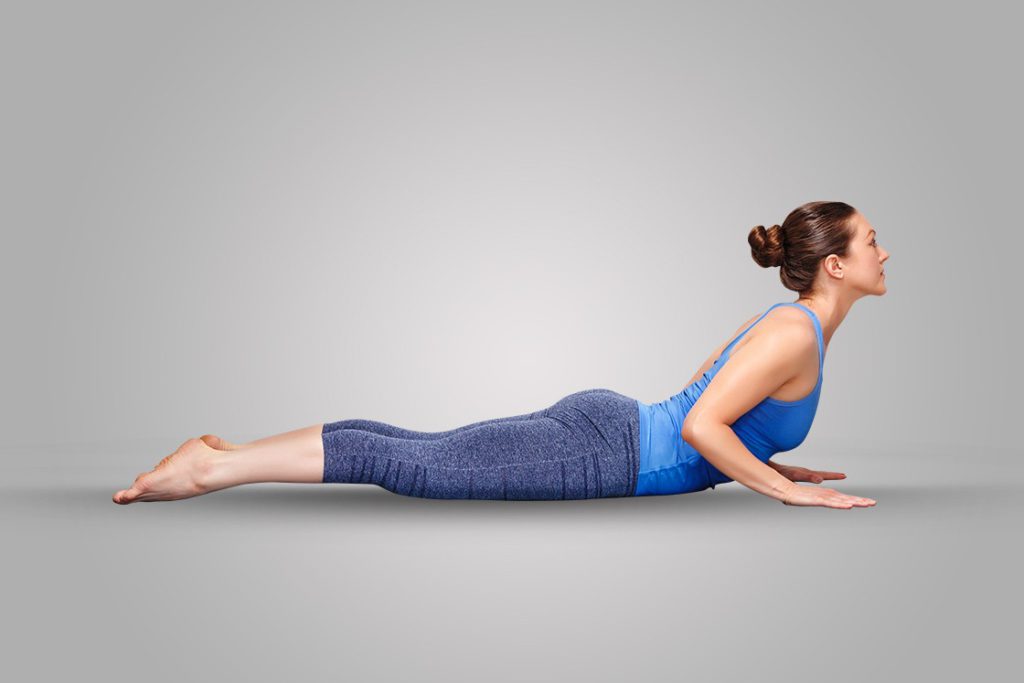
- Inhale, decrease the hips, level the toes again, and slide the chest ahead.
- Arch the again, rolling the shoulders down.
- Slowly search for, lifting the chest and head like a cobra elevating its hood.
- Chant “Om Pushne Namaha” in the course of the follow of Bhujangasana.
- Maintain the pose with managed respiratory, specializing in opening the chest and lengthening the backbone.
- Put together for the following pose, Adho Mukha Svanasana (Downward-Dealing with Canine), as you transition from Bhujangasana.
Advantages of Bhujangasana (Cobra Pose)
- Spinal Flexibility: Bhujangasana actively stretches and opens up the backbone, selling flexibility in the whole spinal column.
- Strengthening Again Muscle tissue: The pose targets the muscle tissues of the again, particularly the decrease again, contributing to energy and resilience.
- Improved Posture: Common follow helps in correcting and sustaining a wholesome and upright posture by strengthening the muscle tissues alongside the backbone.
- Chest Growth: Bhujangasana opens the chest, enhancing lung capability and selling higher respiratory perform.
Precautions for Bhujangasana (Cobra Pose)
- Low Again Sensitivity: People with decrease again points, comparable to herniated discs or continual ache, ought to method Bhujangasana with warning.
- Wrist Well being: Deal with the wrists, particularly in the event you expertise discomfort or ache. Distribute weight evenly throughout the palms and think about using props or modifications.
- Being pregnant: Pregnant people ought to keep away from deep backbends like Bhujangasana, notably within the later levels of being pregnant.
- Neck Pressure: These with neck points or accidents ought to follow Bhujangasana with consciousness. Keep away from straining the neck by retaining actions gradual and managed.
8. Adho Mukha Svanasana (Downward Dealing with Canine)
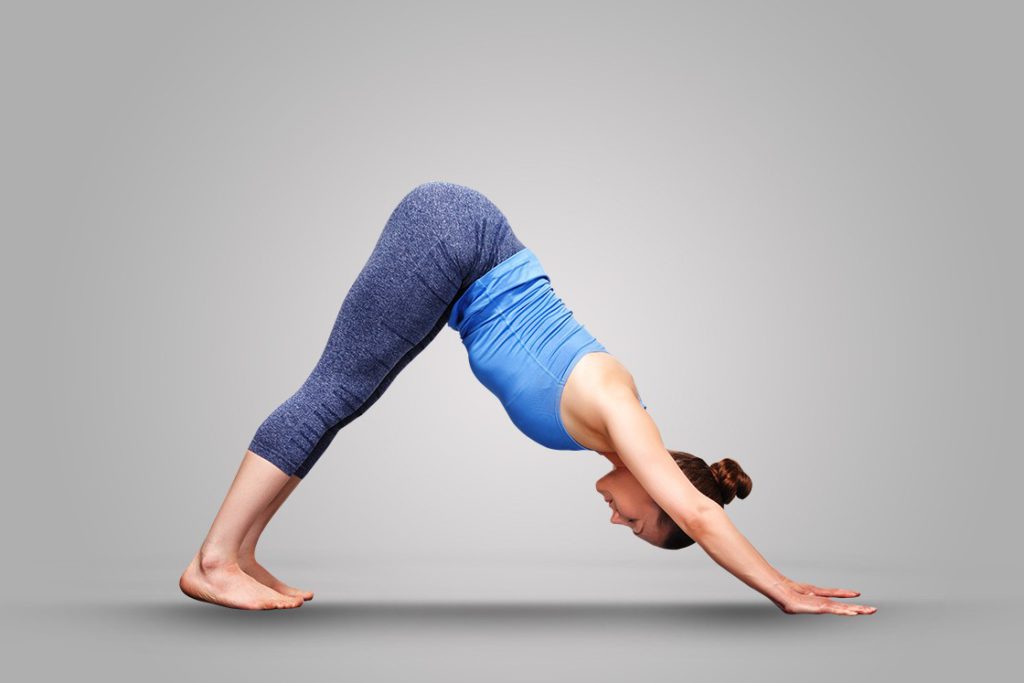
- Exhaling, carry the hips and push them backward, putting the heels on the ground.
- Straighten the arms, reducing the pinnacle between them, forming an inverted V with the legs, arms, and again.
- Press the palms and heels firmly into the ground, partaking the core muscle tissues.
- Take just a few breaths on this place, permitting the backbone to elongate, and sustaining a gradual downward orientation.
- Chant “Om Khagaya Namaha” in the course of the follow of Adho Mukha Svanasana.
Advantages of Adho Mukha Svanasana (Downward Dealing with Canine)
- Spinal Stretch: The pose supplies a deep stretch to the whole size of the backbone, selling flexibility and relieving stress.
- Strengthens Higher Physique: Adho Mukha Svanasana engages the arms, shoulders, and higher again, contributing to energy and stability within the higher physique.
- Enhanced Circulation: The inverted place encourages blood circulation to the mind, enhancing circulation and offering a revitalizing impact.
- Hamstring Flexibility: The elongation of the legs in Downward Dealing with Canine helps stretch and enhance flexibility within the hamstrings.
Precautions for Adho Mukha Svanasana (Downward Dealing with Canine)
- Wrist Sensitivity: People with wrist points or carpal tunnel syndrome must be cautious. Distribute weight evenly throughout the palms and think about using props for assist.
- Excessive Blood Strain: These with hypertension ought to follow Downward Dealing with Canine with consciousness, avoiding extreme pressure and guaranteeing a gradual transition into the pose.
- Being pregnant: Pregnant people, particularly within the later levels of being pregnant, ought to modify or keep away from deep inversions like Adho Mukha Svanasana. Seek the advice of with a certified teacher for appropriate variations.
- Current Shoulder or Arm Harm: If you happen to’ve had a latest shoulder or arm damage, method this pose with care. Contemplate modifying the pose or avoiding it till you’ve recovered.
9. Ashwa Sanchalanasana (Equestrian pose)

- Inhale to convey the correct foot ahead between the palms, bending the knee.
- Concurrently, decrease the left knee to the touch the ground, tuck the left toes in, and push the pelvis ahead.
- Tilt the pinnacle backward to gaze up, sustaining a delicate arch within the backbone.
- Chant “Om Adityaya Namaha” in the course of the follow of Ashwa Sanchalanasana.
- Put together for the following steps within the Surya Namaskar sequence, seamlessly transitioning from Equestrian Pose.
Advantages and precautions of this pose is defined in pose 4 of this solar salutation sequence.
10. Padahastasana (Standing ahead bend)

- Exhaling, convey the correct foot ahead and bend ahead on the hips.
- Deliver the palms to the ground beside the toes, sustaining a straight backbone.
- Recite the mantra, “Om Savitre Namaha,” in the course of the follow of Padahastasana.
- Emphasize lengthening the backbone whereas retaining the pinnacle near the knees.
- Put together for the following steps within the Surya Namaskar sequence, easily transitioning from Standing Ahead Bend.
Advantages and precautions of this pose is defined in pose 3 of this solar salutation sequence.
11. Hasta Utthanasana (Raised arms pose)

- Inhale to boost the torso, standing erect.
- Stretch the arms upward, bringing them parallel to one another with palms going through one another.
- Chant the mantra “Om Arkaya Namaha” in the course of the follow of Hasta Utthanasana.
- Put together for the following steps within the Surya Namaskar sequence, transitioning seamlessly from Raised Arms Pose.
Advantages and precautions of this pose is defined in pose 2 of this solar salutation sequence.
12. Pranamasana (Prayer pose)

- Exhaling, gently convey the arms down to affix the palms in entrance of the chest.
- Chant “Om Bhaskaraya Namaha” in the course of the follow of Pranamasana.
- This marks the completion of 1 spherical of Surya Namaskar.
- Put together to begin the following spherical or transition to rest pose like Shavasana.
- Keep a targeted and meditative state, acknowledging the completion of the sequence.
Advantages and precautions of this pose is defined in pose 1 of this solar salutation sequence.
How Many Solar Salutations Ought to You Do Day by day?
Now that you just’ve delved into 12 steps of Surya Namaskar, a standard query arises: What number of rounds do you have to goal for in your every day follow? Earlier than even that, What’s one spherical of Solar Salutation?
A one spherical of Solar Salutation encompasses two sequences. The primary sequence entails main with the correct foot in positions 4 and 9, whereas the second begins with the left. It’s counted as one spherical of solar salutation.
For these in good well being, commencing with 12 units (6 rounds) of Surya Namaskar (which interprets to 288 poses) is a healthful start line. As stamina and familiarity develop, think about steadily growing the rely.
If you happen to’re new to the follow of solar salutation, a modest begin of three rounds permits for a delicate initiation. Prioritize kind and sync your breath with every motion. As your physique adapts and strengthens, think about including 1 or 2 rounds incrementally. Deal with a gradual and sustainable ascent.
Precautions and Contraindications
Surya Namaskar, with its rhythmic mix of poses and respiratory, is a transformative follow. Nevertheless, it’s very important to method it with a conscious consciousness of your physique’s indicators and potential limitations.
Prioritize security by adhering to those precautions and being conscious of contraindications throughout your Surya Namaskar follow:
- Conscious Respiration and Motion – Syncing breath with motion is prime. Guarantee a acutely aware alignment to keep away from pressure.
- Submit-Surgical procedure Warning – If you happen to’ve not too long ago undergone surgical procedure or skilled a mind haemorrhage, method Surya Namaskar with warning or as suggested by a healthcare professional.
- Timing and Preparatory Measures:
- Follow Surya Namaskar on an empty abdomen after cleaning your bowels.
- Heat-up adequately with light stretches earlier than initiating the sequence.
- Avoidance in Particular Instances – People with circumstances like hernia or intestinal tuberculosis ought to chorus from Surya Namaskar.
- Monitoring Blood Strain – When you have blood strain issues, it’s advisable to follow beneath professional steering, guaranteeing a managed and monitored method.
- Variations for Different Health Ranges – Surya Namaskar could be tailored primarily based on particular person health ranges. Start steadily, and modify poses as wanted.
Surya Namaskar Advantages
Surya Namaskar, or Solar Salutation, isn’t only a yoga sequence; it’s a powerhouse of well being advantages. It serves as greater than a warm-up; it’s a gateway to invigorating your whole physique. As you progress via solar salutation poses, your main muscle teams awaken, setting the tone for a dynamic follow. The rhythmic circulation, particularly in Solar Salutations B, not solely elevates your coronary heart fee but in addition tones muscle tissues, sculpting your arms, abs, and legs.
Bodily Well being Advantages
- Flexibility Enhance:
- Surya Namaskar’s dynamic poses stretch and tone muscle tissues, enhancing total flexibility. Common follow ensures your physique strikes with ease.
- Metabolism Magic:
- Surya Namaskar sparks the endocrine system, resulting in a metabolic increase. Say hi there to improved digestion and maintained blood sugar ranges with this sacred follow.
- Cardiovascular Concord:
- The sequence entails inverted poses, selling higher blood circulation and a more healthy coronary heart. Maintain your cardiovascular system in test with Surya Namaskar.
- Muscle Strengthener:
- Strengthen muscle tissues from head to toe. Surya Namaskar targets varied muscle teams, serving to you construct a strong and toned physique.
- Energizing Respiratory System:
- Breathe in, breathe out. Surya Namaskar synchronizes breath and motion, enhancing respiratory perform. Your lungs will thanks for the revitalizing exercise.
- Weight Administration Ally:
- Say goodbye to extra weight. Surya Namaskar, with its calorie-burning magic, aids in weight administration when practiced usually.
- Balances Ayurvedic Doshas: By incorporating correct respiratory all through the poses, Surya Namaskar helps in regulating Vata, Kapha, advert Pitta. That is so as a result of all of the 5 components are balanced.
Psychological Well being Advantages
- Stress Buster:
- Wave stress goodbye. Surya Namaskar’s rhythmic circulation and conscious respiratory ease stress, leaving you with a way of calm.
- Thoughts-Physique Concord:
- Expertise the synergy of thoughts and physique. Surya Namaskar fosters a connection between bodily actions and psychological focus, selling total concord.
- Temper Enhancer:
- Elevate your spirits. The follow stimulates the discharge of feel-good hormones, combating temper swings and selling emotional well-being.
- Mindfulness Magnet:
- Immerse your self within the current second. Surya Namaskar’s meditative points domesticate mindfulness, enhancing your psychological readability.
- Nervousness Alleviator:
- Discover serenity inside. Surya Namaskar’s calming results prolong to lowering nervousness, offering a psychological sanctuary within the midst of every day chaos.
- Enhanced Focus:
- Sharpen your focus. The follow of Surya Namaskar engages your thoughts, selling focus and psychological alertness.
Conclusion
Incorporate the 12 poses of Surya Namaskar, a sequence that extends a heartfelt providing to the solar. That means “Solar Salutation” in Sanskrit, it aligns physique, thoughts, and spirit, rooted in historic yogic traditions. The rhythmic mix of breath and motion gives myriad advantages – bodily firming, flexibility enhancement, immune system activation, and stress discount.
Whether or not you’re a newbie searching for alignment suggestions or an teacher aiming to combine it into courses, Surya Namaskar illuminates the trail to holistic well-being. Start every yoga session or motion follow with this transformative sequence, embodying the essence of reverence to the solar.
Surya Namaskar FAQs
The optimum time to follow Surya Namaskar is in the course of the early morning, ideally throughout dawn. The contemporary air and mild daylight improve the advantages, offering a revitalizing begin to your day. If mornings are difficult, it can be finished in the course of the night, however dawn stays the popular selection for its holistic impression on thoughts and physique.
Sure, it’s appropriate for all of the physique varieties so long as you aren’t having any medical points. Surya namaskar poses or whole sequence could be custom-made as per the comfort. There are a number of variations of surya namaskar obtainable for the children, pregnant girls, senior residents.
It’s okay to follow Surya Namaskar with out chanting the mantras. Newbies may follow it with out chanting for 4 weeks constantly and as soon as modifications in power ranges is noticed, you may simply fuse the chanting into the follow to realize the non secular advantages.
There is no such thing as a strict restriction about practising Surya Namaskar throughout menstruation. Nevertheless, if any uneasiness or ache is felt in the course of the follow, it should be skipped for just a few days. Additionally, you may cut back the variety of rounds throughout main day of the interval and improve it steadily with passing
12 rounds of Surya Namaskar are thought-about a perfect follow. Nevertheless, learners can start with 2-4 rounds. It may be elevated as much as 108 rounds of solar salutations most if appears handy.